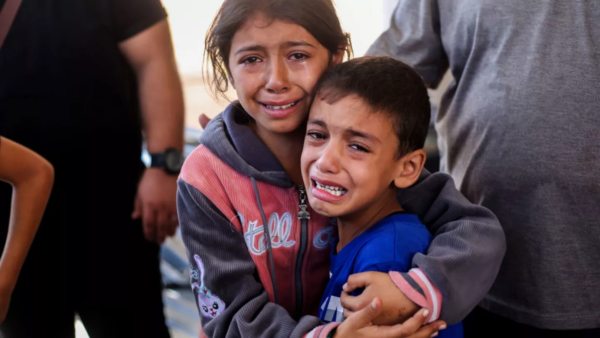Photo: Over 13000 children in Gaza are being displaced every day according to MSF. Children as young as five told MSF that they “would prefer to die.” The Gaza genocide has been compared to the Holocaust by the Brazilian president “It’s not a war of soldiers against soldiers. It’s a war between a highly prepared army and women and children ”, he said
By: Ilan Pappé
‘I was held for two hours. The first round of questions was about my views on Hamas.’
I was questioned for two hours about my political views on genocide and protest slogans when I flew into the US
I’m an Israeli historian living in the UK, best known for my books on the history of Palestine and the Middle East, which challenge the official Israeli version of history. This month I was invited to the US by a new Arab American organization, al-Nadwa (the Discussion), to share my thoughts on the situation in the Gaza Strip. I also addressed a Jewish Voice for Peace group in Michigan and went to talk to students encamped at the University of Michigan in Ann Arbor.
After an eight-hour flight from Heathrow, I was stopped on arrival at Detroit airport by two people who I thought were agents of the FBI, though I later found out they were agents of the Department of Homeland Security. Two men approached me, flashed their badges and demanded I accompany them into a side room.
My initial attempt to find out why I was stopped was disregarded. It was clear that the agents were asking the questions and my role was to answer them, and not the other way around. So until today, at least officially, I did not receive any explanation for the incident.
I was held for two hours. The first round of questions was about my views on Hamas. Then the agents wished to know whether I thought Israel’s actions in the Gaza Strip amounted to genocide and what I think of the slogan “Palestine should be free from the river to the sea”. I said yes, I do think Israel is committing genocide. As to the slogan, I said that in my view people anywhere in the world should be free.
Then the agents interrogated me about who I know in the Arab American and Muslim American community. They asked me to provide them with telephone numbers, took my phone away for quite a long period and asked to wait until they made some phone calls before they let me go.
The point of sharing this experience is not to ask for compassion or even solidarity; there are far worse ordeals in life. But the incident was still troubling – and part of a much larger and more serious phenomenon. Why are ostensibly liberal and democratic countries so interested in profiling or restricting academics who are trying to share our professionally informed views about Israel and Gaza with the North American and European public?
Consider the refusals of France and Germany to allow Dr Ghassan Abu Sitta, the rector of the University of Glasgow, to attend events similar to the ones I attended in the US. In addition to his academic post, Abu Sitta has practiced as a physician in Gaza and is able to provide first-hand testimony about what is happening there on the ground. Human Rights Watch noted that the ban on Abu Sitta, reportedly instigated by Germany, “attempts to prevent him from sharing his experience treating patients in Gaza [and] risks undermining Germany’s commitment to protect and facilitate freedom of expression and assembly and to nondiscrimination”.
The longevity of the lobby in the US and UK pre-empts any free discussion on Israel and Palestine, even in the academy
For my part, I have written more than 20 books about Israel and Palestine and wish to provide historical and scholarly context to the current situation. Many other well-known and well-versed academics who can provide in-depth analysis, which is not always to be found in the mainstream media, are also affected by the threat or possibility of travel restrictions.
This is a serious issue of academic freedom and freedom of expression. Ironically, in most other contexts, academics are more likely to encounter barriers to free speech in the global south, not the global north. On the topic of Palestine, the situation is reversed. Knowing that, it makes sense that it probably could only have been a state from the global south, such as South Africa, that would dare to approach the International Court of Justice to seek an injunction against the genocide that Israel is committing in the Gaza Strip.
These travel restrictions have very little to do with knowledge. The American and British governments rarely ever consult any expert who is not Israeli or pro-Israeli about the nature of the conflict in Israel/Palestine and the brutal Israeli policies of the last 76 years.
The British prime minister, for example, has met a Jewish student union since 7 October but shuns any meeting with Palestinian students, many of whom have lost their whole families in Gaza. Antisemitism definitions, such as those outlined by the International Holocaust Remembrance Alliance, are weaponized to silence any show of solidarity with the Palestinians. Rishi Sunak might have learned why the slogan “Palestine should be free from the river to the sea” is not idiotic or extremist, as he recently suggested, had he been willing to learn and listen.
The Guardian


Leave a Reply
You must be logged in to post a comment.